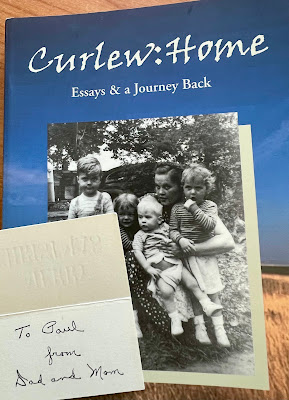Some years ago - when Mom asked what I'd like for a Christmas gift - I'd ask each year for a book about Iowa stuff. I received these for several years, recently located them in a storage box, and now am going these gift books.
I do recall paging through Montag's book, and mostly remembering that it was the only written description of corn shelling that I could ever recall encountering - and that it wasn't a bad description, though his writing was overwrought when it came to describing how the physical labor part feels (admittedly that kind of labor does feel good or rewarding or something). Plus he was just a once or twice per year corn sheller guy - not at the level of we all-day every-day every-summer (and sometimes in other seasons) experts.
What I didn't recall was the incredible extent to which Montag's experiences overlapped with ours. He's about 10 years older, and they were renters at the time this was written - so as I recall it our setting was a bit more "modern" in some significant ways. But nonetheless so much of this is right on target. (He does spend some time trying to sort out why he wanted to become a poet - less interested in that but ok that's his prerogative.)
Curlew is a tiny town about 30 miles or so pretty much straight west of St. Joe. Whereas we saw the West Bend elevator from the east, he was looking at it from the west. And wandering into Algona, Humboldt, West Bend, Emmetsburg etc - all the familiar towns.
But mostly he was on the farm.
Stuff that sounded pretty familiar:
He's the oldest of nine children.
p. 18 - reading Snowbound
p. 73 - parents using a wagon hoist to lift up the front end of a wagon (no hydraulic hoist) - oats into elevator to be lifted into the bin - there were parts of this that a young kid could help with. (Dropping the pin into a wagon tongue is my very earliest memory of "helping" with farm work. Ernest J. couldn't turn around far enough to see exactly where he was backing up.)
p. 82 - Sunday bicycle ride "around the block" (meaning the four miles around the section)
p. 87 - Sunday making a fire and roasting hot dogs; marshmallows
p. 89 - narrow highway 18, with curbs (just like 169)
p. 94 - their telephone ring was two shorts and a long (I think ours was the reverse)
p. 102 - talking about the Curlew centennial history book of 1984 (did they use St. Joe (1976) as a model?
p. 112 - oldtimers reminisce about the winter of 1936
p. 116 - hauling coal, delivering it through a little basement window
p. 136 - wringer washer in the cellar (it's not a "basement")
p. 140 - throwing baseball against the front of the barn, "playing catch with myself"
p. 146 - garbage pail in the "entryway" - this is where they always enter the house, it faces east
p. 149 - playing pinochle and 500; a sister bids nine diamonds
p. 150 - they buy The Book of Knowledge; also Encyclopedia Brittanica
p. 167 - visiting the farmstead, pretty much everything gone. Some trees soughing. Decaying corn crib.
p. 183 - he reads The Kid Who Batted 1.000
p. 217 - walking beans for the neighbors; cockleburrs; washing up in a pan placed on the porch outside their house
p. 218 - walking around the former farmstead again - "it's all gone, and nothing is gone"
p. 222 - BB guns; shooting a car window
p. 227 - the corn shelling description. The sheller man arrives early. "He gets so much per bushel shelled and so much per bushel hauled." He remembers the sheller man being very particular ("always insists upon doing this part of the job himself") about linking the chains of the drag sections - EMG the same, this was an important ritual at the start of every set. "Dinner is a big meal" - sitting a spell in the shade after. Etc.
p. 241 - rotary hoeing the corn; the blade picks up rocks
[He several times mentions the rock pile - a place to play, a place where rocks were brought in from the field, of course.]
p. 259 - butchering chickens; hot water for scalding feathers, barrel with newspapers for fire to singe off hairs
p. 287 - killing rats (after moving the feeder)
p. 307 - visiting the cemetery; a deceased sibling
p. 311 - "I don't want the sadness of the loss to be what is remembered. I want to remember the joy of those years . . ."
Thanks, Mom & Dad!
